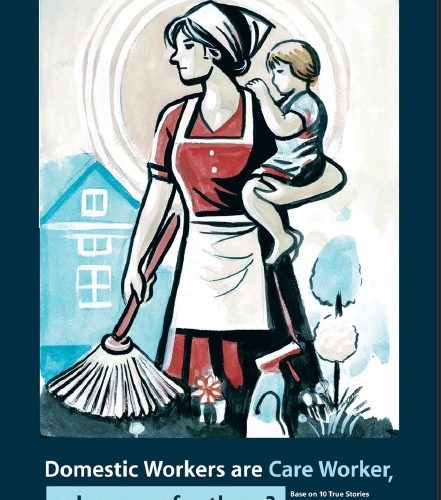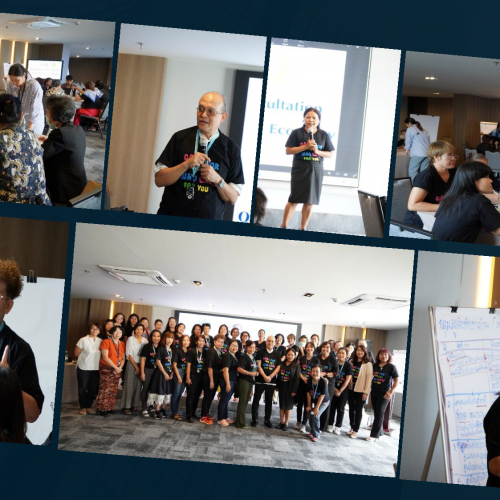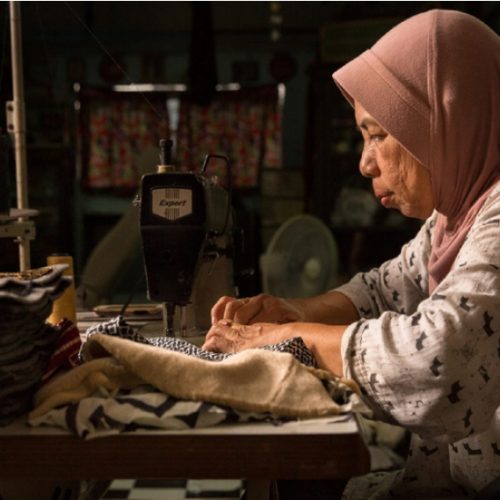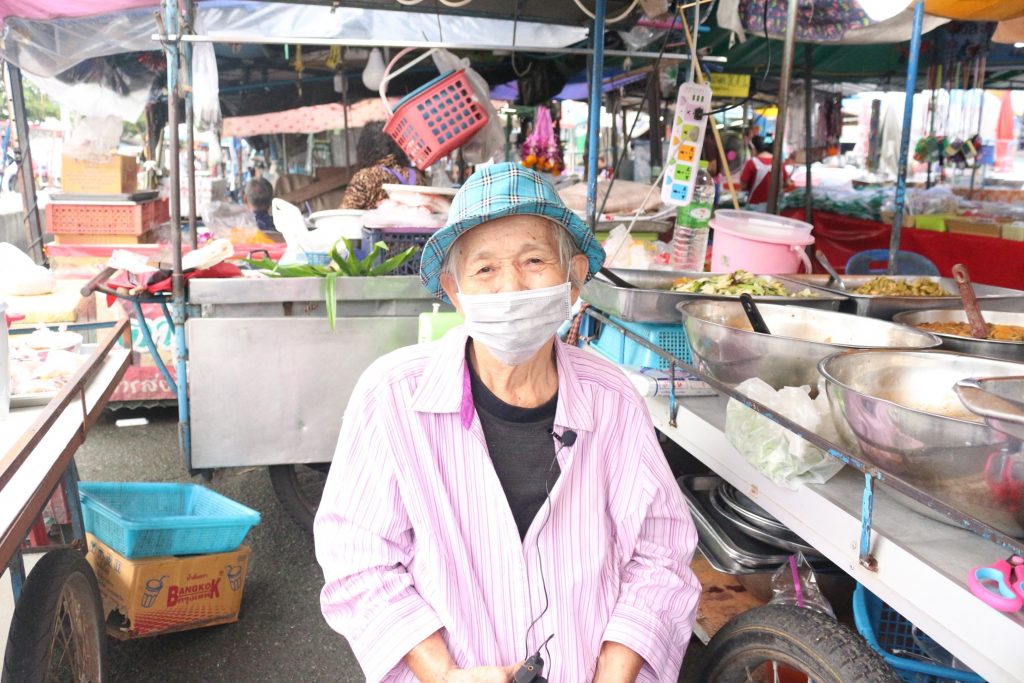
If we don’t wake up and do it, we’ll starve to death
Sawasdee kha.
My name is Cho-iam Jindawiwat. I am a 75-year-old woman food vendor from Nakkeela Village, Economic Area Market, Bangkok. I’ve been selling food for over 30 years – ever since the market opened. I’m originally from the north of Thailand. My hometown is a long way from Bangkok, but my grandchild asked me to come here; she told me that this location is good for business. She was right. Business was good for several years. But since the outbreak of COVID-19, our business is not doing well. I usually give away the cooked food that I am unable to sell. There are many people who do not even have food to eat these days. I take some back home for our family to eat.
I usually open my food stall at six o’clock in the morning and keep it open until mid-day or one o’clock in the afternoon. I start preparing the ingredients for the next day at midnight and by 6 AM I am ready. My sister and I push our large food cart to the market by ourselves. We return home after mid-day because another vendor uses that space in the market in the afternoon. I take a break after coming back home. Again, our preparation for the next day starts at midnight. If we don’t wake up and do the work. we’ll starve to death.
There are three people in my family. My elder sister, my grandson, and I. My sister has several health problems, including diabetes, hypertension, and dyslipidemia. I am lucky because I have no health problems. I only have osteoarthritis of the knee for which I need to take medicine. It is sometimes very painful. I have three daughters. All of them have their own families now. They live in different places. Each one of them has several obligations, such as repaying house and car loans. They must look after their families. Plans for the future? What can I plan at my age? As long as I have energy, I will continue to sell food. I don’t want to bother my relatives; it will make me very uncomfortable to depend on others because each one has their own burdens.
“Before Covid-19, my daily income was sufficient to live. However, the last one year has been very bad. I do not receive a return on my investment. For example, if I am spending 1,500 Thai Baht for preparing food, I am getting back only 1,000 baht. These days, people rarely buy food. Everyone is afraid of Covid-19, no one wants to go out and purchase food. The market itself was closed for a long time. I didn’t even have enough money to pay our house rent. When we could not sell, we had to be very careful. We ate less, we ate what we could afford”
Government support? Yes, I receive a monthly old age allowance of 700 Baht. I have also got the free vaccination because my daughter took me to be vaccinated; I couldn’t have gone by myself. I’d really like the government to provide financial assistance to subsidise costs of occupational capital. We live from hand to mouth. I have no capital, so I need to borrow money from someone else. Fortunately, I am member of the cooperative. So we are able to borrow money to invest in our business and pay back monthly with a low interest rate. Money lenders charge a very high 20% interest rate. I know, because I have borrowed from them in the past. I borrowed 10,000 Baht once and had to pay 2,000 Baht in interest. I didn’t borrow from them again because of the high interest rate.
(Interview in Thai by Ms Trissanat Phansawat and translation into English by Ms Kullanat Suksumek. Both of them work with HomeNet Thailand.)
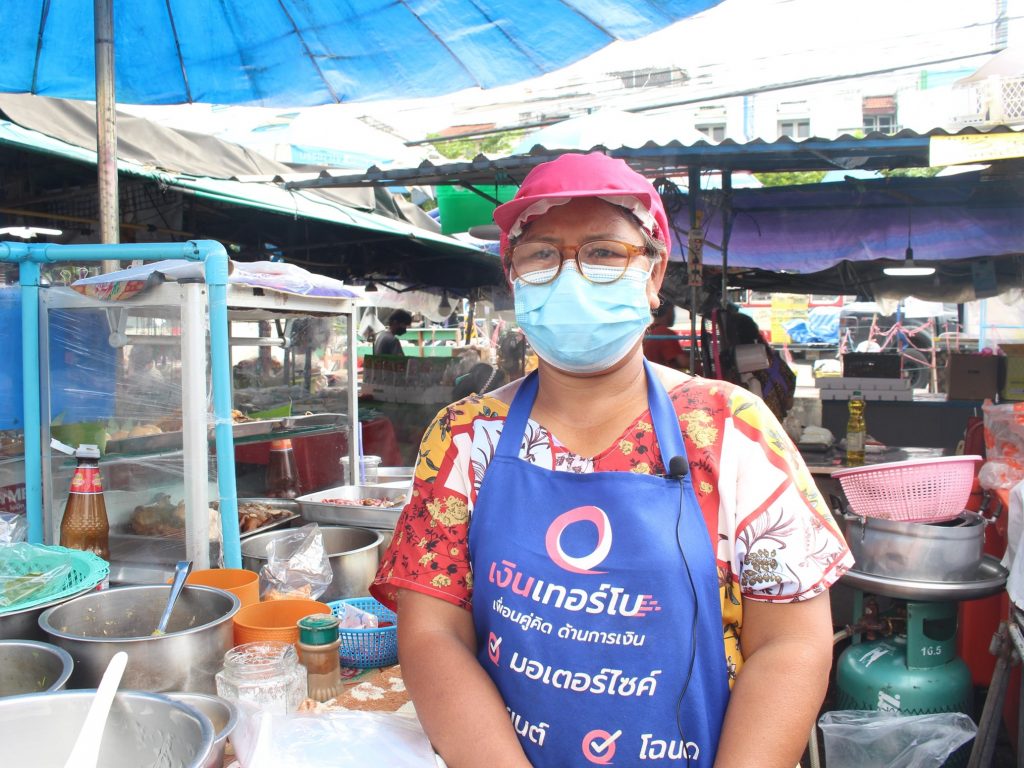
“I want the government to help subsidise occupational capital and take care of family breadwinners”
Sawasdee kha. I’m Sabai Saiyasat, also known as Bai. I’m 50 years old. I sell Pork Blood Soup and noodles at Nakkeela Village, Economic Area Market, Bangkok. I was recently infected by COVID–19 and quarantined for a few weeks. I returned to my work after I got better. Luckily, my small shop is still doing well. But sometimes, I must stop because I have no capital. I can sell up to 3,500 baht per day. That includes my raw materials cost, not net profit. I earn 10,000 Thai Baht per month on average. But that is not sufficient for the needs of our family. I’m the eldest one who looks after everyone in the family. There are seven people in my family and we all live together. Our mother, who is blind now, two grandchildren who are in elementary school and my daughter who is in the university. At present, they study online at home. My younger sibling has returned to work because the 14-day quarantine period ended. When our entire family got COVID-19, we received food packets from Khun Ya who is the president of the Nakkeela Community Service Cooperative. I have to thank everyone for always helping us because while I was infected with COVID-19 my husband was the only one to look after everyone. He can cook and do all household work, but he doesn’t know how to work at the street food stall.
I began to sell at this marketbecause I have a family to look after. My parents have always lived in this area. I started selling food when I was very young. I was just 20 years old then, so I have been doing this for 30 years now. In fact, I am part of the group of people who fight to keep this market here. The National Housing Authority wants to move us to the opposite side, but our fight has helped us to continue vending at this market until now. Our joint struggle brought us together, so now vendors of this market help each other in managing the market.
Before Covid-19, my income was sufficient for our family. But when this disease arrived, our lives changed. I used to sell noodle soup both in the morning and evening. Now I sell only in the morning with the help of my husband. He can’t work hard because he had a brain surgery. Food vending is not easy work. He just does not have the strength to do it. He helps me look after our mother and also with house work. I could not buy things at reasonable prices when the wet markets were closed. Supermarkets are not affordable for us, we also do not find everything there. After this pandemic is over, I want to pay off all my debts and reduce the sale to just one product and give the business to my daughter.
At the moment, we’re lucky because we are still able to sell food. But my business is really small. I am unable to save enough for capital. I’m looking for funds to invest as occupational capital. I would like the government to assist in subsidising occupational capital and take care of family breadwinners. When families like mine are in trouble, there is no one to assist us. The government should find out how many people are the single breadwinners for their families. I also want the government to visit and find out about the situation of other villagers too. I know that there are people who are even worse off than us.
My husband and I received only 5,000 Thai Baht each as cash subsidies from the government. Our blind mother and my husband were the only two persons from our family who have received vaccination so far. I was unable to register in time like others. I still hope to get it, even though it has been postponed. Without vaccination, we are not allowed to sell food. Since I am the one who does the food vending to earn for our family, everything has come to a halt after I got the infection. I don’t know how I got the virus. I didn’t go anywhere; I just came back home after selling food and then I was sick. Now I am waiting for the vaccine.
(Interview in Thai by Ms Trissanat Phansawat and translation into English by Ms Kullanat Suksumek. Both of them work with HomeNet Thailand.)
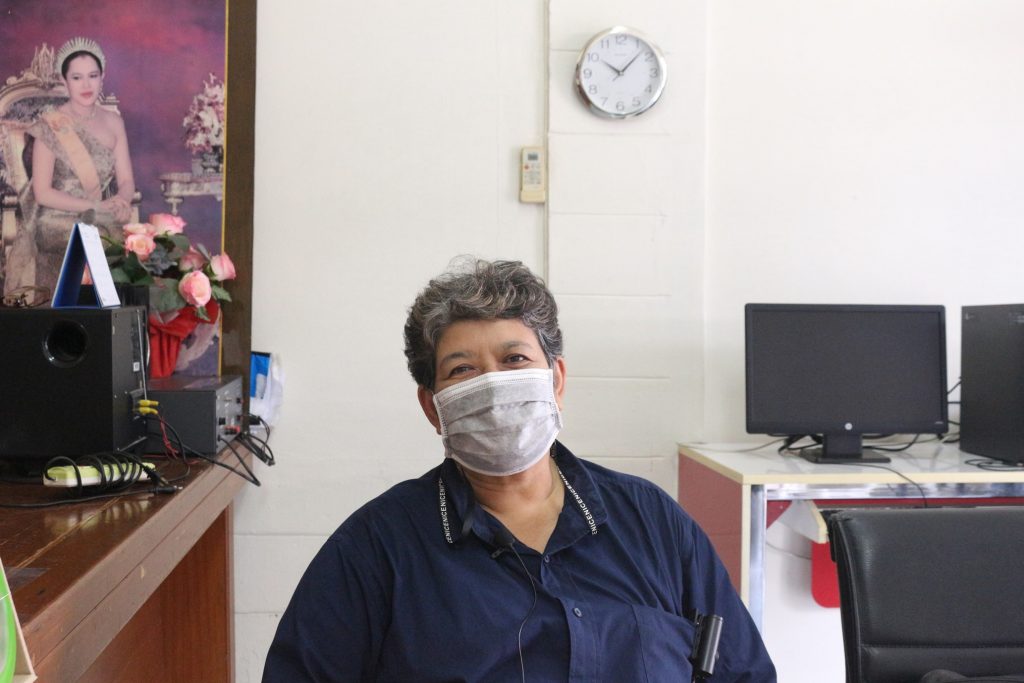
“When we come together, we gain power”
Sawasdee kha. My name is Ranu Daweloa, I am the president of Nakkeela Village, Economic Area Market and committee of Nakkeela Community Service Cooperative. Since 1997, my friends and I have been selling food in this market. The National Housing Authority came to control and regulate us by setting a monthly rental amount of 375 Thai Baht. Later, the National Housing Authority said that they would develop a market for us in the area opposite the present market. We came to know later that the National Housing Authority gave the job to a private company. This meant that we would need to pay a higher rent to the company and be pushed to the back zone while the front zone will be for the fancy shops owned by rich people. So, we refused to go to the market that authorities provided us.
On 2 August 2004, a large group of strong men came to destroy our belongings at the market at 2 am. We escaped to survive. Later, we filed a complaint in the court. We won the case. The company paid us compensation. But only some of us got it.
But the story did not end there. Later, the Housing Authority filed a lawsuit against all 149 of us. We fought and went to the Court of Appeal. This time we were defeated. Now the Housing Authority is just letting us sell at this market until they can find us a suitable place as per court orders. They have promised to arrange the opposite side of the market properly for us.
A group of food vendors got together in 2007 and established a savings group. At that time, they had only a hundred thousand baht in savings. Later the vendors formed Nakkeela Community Service Cooperative with 200 members. Now the savings is around 5 million Thai Baht
The group conducts regular activities with the community. Every time the community has some activity, the group cooperates, participates, and supports in all matters and also makes a community safety plan. The group donates money to the community to take care of the CCTV. The group organises a children’s day event annually.
Prior to COVID-19 business was good in every store. We have been greatly impacted by this pandemic. Hardly anyone comes to the market. Then there are around 25 out of our 200 members who have been infected with the coronavirus. Clothing stores have closed. On the whole, business has gone down by around 50%.
The group has helped members by providing food packets to those in need. The group received these food packets from Foundation for Labor and Employment Promotion or HomeNet Thailand and the Federation of Informal Workers of Thailand. There was also a group of people who joined hands with the market group to bring cooked food boxes to distribute regularly to the vendors and community members.
When confronted with difficulties, we must always remember that coming together as group creates strength and unity. As we see now, members are helping each other, negotiating with the government and keeping the community together. There have been some positive outcomes from the negotiations with the government too.
Going forward we have the following three key demands to our government:
- We would like the government to assist us with low-interest or no-interest funding for our occupation since many families of our members are in trouble. There are family members who are unwell at home, our sales have reduced and some of our members borrowed money from informal lenders. This is a sad situation and help is urgently needed in this area.
- We would like the government to ensure vaccination to all because it is still hard to access for many of us.
- Our members were unable to register for COVID-19 cash grants through internet. So, they didn’t get any support. The government should provide cash grant according to the house registration.
(Interview in Thai by Ms Trissanat Phansawat and translation into English by Ms Kullanat Suksumek. Both of them work with HomeNet Thailand.)




